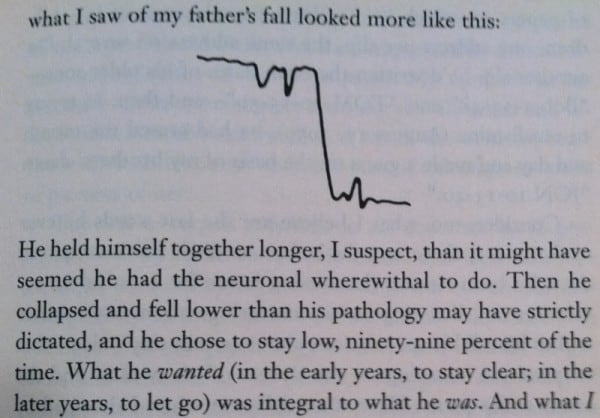Many folks asked this past week how I’ve felt about Steve Jobs’s death, and wondered why I haven’t written about it.
When I first heard the news, I thought of a graph Jonathan Franzen drew in “How to Be Alone,” about how Franzen’s ailing father made no concessions to Parkinson’s and then, when that effort finally became unbearable, declined very rapidly, almost willfully:

The public never saw Steve Jobs suffer, but I wonder if he made the same journey, holding on to everything he loved until his resignation, and then, in the space of only a few weeks, letting go. Unlike the serial entrepreneurs now in vogue, he was someone who for his entire life made sense in only one place, at Apple.
Many, many folks have already talked about what he left behind. Over the past few days I’ve noticed that all of us, from sandwich-makers to software developers, seem to be trying a little harder to make it beautiful. On Friday night, when it was just about to get dark, the folks at Redfin opened some beers and found ourselves talking about whether we were living up to our craft. Nobody mentioned Steve.
But something about the beatification of Steve Jobs in the media and blogs has, for me, been almost unbearable. He is already in danger of becoming a Twitter hashtag, a dorm-wall poster, an online fashion accessory. I hesitated to write a post about his death because I couldn’t imagine you wanted to read another one.
Many eulogies celebrate Steve in terms of his “products” — those mass-produced little gadgets that we love for letting us check email in front of our friends – and lose sight of his grass-strained spirit. What always moved me about Steve was the calligraphy and the LSD, the passage to India and his firing from Apple, his struggles at NeXT and his return from the wilderness.
The insistence on Steve’s perfection, on the vast difference between him as a producer and us as consumers, seems inhuman and even lonely to me. I wish we could take a moment in eulogizing Steve to grieve for him as one frail human to another, and feel in his passing the miracle of every human life; so many other people, geniuses on a smaller scale, are struggling his struggle. It hurts me that we have so much love to give to Steve and not to them.
I also wish we could find in him a more useful story to tell ourselves than one of utter perfection; yes, it is striking that every CEO has an unspoken relationship with Steve Jobs as the ideal leader, but for every CEO I know, that relationship is a fraught one: none of us is comfortable proceeding from the assumption that we’re perfect.
This is why my heroes have always been people who overcame their flaws: blacks and whites lined up on either side of the tracks for Robert F. Kennedy’s funeral procession only a few years after he ordered government snoops to follow Martin Luther King into public restrooms; Robert Kennedy changed. Ezra Pound composed the rag-and-bone poetry of the Pisan Cantos from an open-air cage while awaiting trial for treason.
And this is why Steve Jobs is one of my heroes. He was never perfect, especially when he left Apple the first time, but what I like about him is that he never, until the very end, stopped trying to be.

 United States
United States Canada
Canada